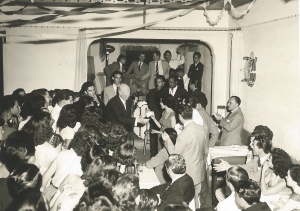Georg III and the Brazilian adventure
Cervejaria Vienense – when the Schwechat brewery expanded to Brazil
After the war and his return to Austria George III continued to support the takeover policy of foreign breweries and therefore also used his contacts in Brazil, where he had spent several years of war. With a share capital of 11 million Cruzeiros, he founded the Companhia Paulista de Cervejas, in which the Schwechat Brewery had held 55% of the voting shares.
He used the equipment of the Nussdorf brewery, which had been bought in 1950 thanks to an increase in the share capital. For the organization of the transport, all machines were dismantled into two halves, one half of which was transported via Hamburg and the other half via Trieste. This was done to ensure that the devices really arrived in South America and could not be set up anywhere near the Ural (George III was a chronic enemy of the Soviets). 8 million schillings and 62 railroad cars were required for that.
The undertaking was fortunate and the Brazilian “Vienense” was successful for a number of years. However, George III, was unable to inspire any other family member to join the “new home” permanently. The poor Brazilian economic situation of the following years and the devaluation of money almost caused the project, however, to fail, so that the “four-in-hand-management” (Georg III, Gustav, Gerhard, Manfred I) were very much in favour of welcoming a new partner. So, the Brazilian brewery group Cervejaria Brahma was taking over the large capital increase and started actively participating in the business management. Subsequently they could sell the entire stake to Cervejaria Brahma until 1959 and withdraw again successfully, as they claimed. It is said that with an investment volume of 9.5 million schillings, cash returns of 16 million schillings were ultimately made.
1954: Tasting of the first glass, the Radetzky March was played as signature music. Marius Mautner Markhof (left) and Georg III (right) with the Viennese master brewer Ing. Urban, who had fled to Brazil from the Russians. He had slapped a communist member of the workers` council on the face and otherwise would have been “transferred” to a GULAG.


